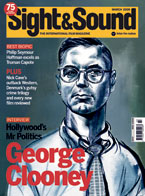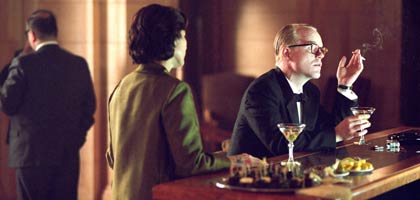
Capote
USA/Canada 2005

Reviewed by Tim Robey
Synopsis
Our synopses give away the plot in full, including surprise twists.
Holcomb, Kansas, 15 November 1959. Four members of the Clutter family are found inexplicably murdered at their farm; a police investigation begins. After reading about the case in the New York Times, the writer
Truman Capote telephones New Yorker editor William Shawn and tells him that he wishes to use the Holcomb killings as the basis for his next book, a non-?ction novel that he expects to be his greatest achievement. Capote and his close friend Nelle Harper Lee travel to Holcomb and begin questioning witnesses, befriending chief investigator Alvin Dewey. On 30 December two suspects, ex-convicts Perry Smith and Dick Hickock, are arrested in Las Vegas; by March 1960 they have been tried and sentenced to death. Capote repeatedly visits the killers on death row, trying to elicit blow-by-blow testimony under the pretext of helping them ?nd an appeal lawyer. During a ?ve-year series of judicial reprieves, Capote ?nds himself stuck in limbo, unable to ?nish his book (now entitled In Cold Blood) and sliding into depression and alcoholism. When the date of execution is ?nally set, he can't face attending and only does so under the stern advice of Harper Lee. The end titles say he never completed another book.
Review
Dusting off the literary biopic is a risky business. The BBC co-productions Iris (2001) and Sylvia (2003) attempted blind leaps of tragic empathy and fell short. It's typical of the more guarded Capote that it never presumes to be on ?rst-name terms with its subject. By examining a sliver of a life, the ?lm-makers dodge many of the pitfalls of the genre - no cycling around St John's Academy with Faulkner under one arm here - and their crisp dramatisation does fascinating justice to its themes.
The ambit of Capote is a single book: In Cold Blood, to which the author devoted either six years or all of his life, depending on your point of view. The book tells the story of the true-life murder of the Clutter family on their Kansas farm and the conviction and eventual execution of the culprits. It's shown here as both Capote's masterpiece and his undoing: a poisoned chalice of a project that he drank to the dregs. What makes Bennett Miller's ?lm so interesting is its determination to cast Capote not as the hero of his own endeavour, but as its Shakespearean villain: a vampiric opportunist seeking literary laurels amid a wreckage of lives, and literally opening the cof?n lids on a quadruple murder that would inspire the best book he never deserved to write.
As Capote, Philip Seymour Hoffman is in complete control of his effects. Regaling the Manhattan literati with a self-serving anecdote about "Jimmy" Baldwin, or admitting to bribing a ticket inspector into a piece of grotesque flattery, the performance seems like its own kind of horribly seductive party trick, drawing us towards an often repellent man like moths to a flame. The closest Hoffman precedent for this is probably his turn as Freddie Miles in The Talented Mr. Ripley (1999). No other actor has the ability to laugh at his own jokes and be so appallingly funny. Admittedly, Hoffman's much taller than Capote was, which necessitates some sleight of hand in the framing department. The Oscar-worthy achievement is really the voice, a quavering, semi-falsetto thing that hangs ironically in the air, trailing bitchy insinuation and self-applause.
Any suspicions that Hoffman's performance will turn out to be a bit of skin-deep, virtuoso grandstanding are laid to rest by how it progressively deepens. The movie shakes Capote out of his complacency almost bodily: he's frozen, by the end, in helpless close-ups, drained of his will to live and write by the ongoing agonies of a project far more taxing than he ever led himself to expect. It's suggested that he may have fallen in love with one of the killers, Perry Smith (played by the magnetic Clifton Collins Jr); their scenes together in Smith's cell, splendidly edited by Christopher Tellefsen, provide plenty of opportunities to read more than just feigned solicitude between the lines.
Capote's screenplay, by the indie actor Dan Futterman (The Birdcage, Urbania), is especially good at enlisting the other characters around its protagonist as voices of reproof and moral conscience. Catherine Keener, solemnly composed as Capote's childhood friend
Nelle Harper Lee, does her best work down the other end of the phone when she's allowed to facially signal her distaste for Capote's project. But it's Chris Cooper's Alvin Dewey, head of the Kansas investigation team, who has the nerve to ask the writer whether the title In Cold Blood refers to the crime itself or its novelisation - one of the few moments when the author seems completely lost for words.
Readers of In Cold Blood - or viewers of the starkly effective 1967 Richard Brooks film - will note how Capote unpacks the real story behind its last
20 pages, documenting the torturous series of appeals that tested the author's resolve nearly to breaking point. But if the film comes down hard on his motives for writing the book, he's nonetheless subject to a fairly typical biopic learning curve: he's forced to take artistic responsibility for the path he's chosen; once he's paid his penance he's in a position to complete the great book of his lifetime. Hoffman's Capote may be given more than enough rope to hang himself, but at least he turns up at the gallows.
Credits
- Directed by
- Bennett Miller
- Produced by
- Caroline Baron
- William Vince
- Michael Ohoven
- Screenplay
- Dan Futterman
- Based on the book by Gerald Clarke
- Director of Photography
- Adam Kimmel
- Edited by
- Christopher Tellefsen
- Production Designer
- Jess Gonchor
- Music by/Music Produced by
- Mychael Danna
- With
- Philip Seymour Hoffman
- Catherine Keener
- Clifton Collins Jr
- Certi?cate 15 114m 10s
